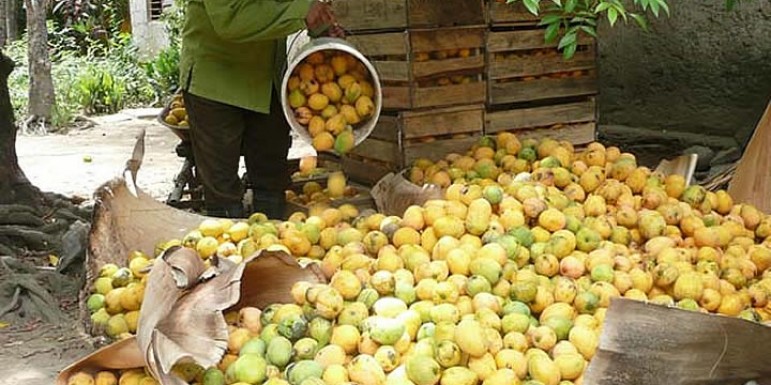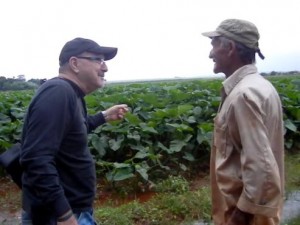
Debts, legality and courtrooms
HAVANA — If you fail to pay your light bill, the power company will turn off your light until you pay. It’s no use saying that you don’t have the money. Either you pay or you buy candles and practice walking around the house as if you were blind.
There is another type of blindness.
Back on April 2, the prime-time TV newscast reported that ACOPIO — and presumably other government agencies — owed a lot of Cuban pesos (CUP) to farmers. It didn’t mention the amount, but very reliable sources say it’s up in the millions and involves more than just one province.
I looked for the item in the printed press. Didn’t find it. It had appeared and vanished like a firefly on the TV screen. And that was almost two months ago. However, thanks to the Internet, I recovered it. And the transience of the TV denunciation became apparent at once.
ACOPIO is the state-owned company to which producers are obligated to sell at privileged prices (favoring ACOPIO) between 70 and 80 percent of their production.
I have written about the history of this state agency for years. I even remember that a TV newscast had showed a meeting at which President Raúl Castro Ruz — at the time newly elevated to the post — spoke harshly about the millions of pesos that had not been paid to the farmers.
If memory serves me right, the debt was paid by the banks. And what are the banks except the depositories of our money?
Every year we witness a reprise of the problem. Today we’re looking at a new debt, whose amount the TV report did not specify, I repeat, and is the result of accumulated arrears affecting the food producers.
On May 28, Progreso Semanal learned that ACOPIO owes the Ciro Redondo Credit and Services Cooperative (a private enterprise) in the municipality of Batabanó, province of Mayabeque, the sum of 1 million Cuban pesos (CUP), an amount that has not been fully paid.
The unpaid-bill situation is serious from every point of view. In the farm sector, we’re talking about suppliers who are indispensable to the basic project of our economy, both to increase the daily menu at home, to lower the price of the food, and to prevent the bloodletting of almost 2 billion dollars that the country spends on imported foodstuffs, many of them perfectly replaceable by our own products.
When ACOPIO and the other agencies involved don’t pay the producers, as the TV report says, the process of changes that we’re going through is hampered, and the effort of the farmers and their organizations is thwarted. The farmers become discouraged and are faced with the added quandary of what to do with their produce.
The choices they have are few: “give it to the pigs,” i.e., stop feeding humans and feed animals with the food that humans need; stop producing, as is happening in Güira de Melena (and perhaps elsewhere); or “reroute” the merchandise to the underground market, a commercial operator who speculates against all of us, who must pay sky-high prices.
This “detour” into the black market could land the producer in the courtroom for illegal selling. And here’s the point.

It’s imperative that the press report the news and air it boldly, but it is awful that it later makes it vanish — in the finest Mandrake the Magician style — and doesn’t take it before the public, who is burdened and battered by the subject of food.
But nonpayment of bills or months-long arrears are not solved by printed words or televised images.
When a state-owned company says that it can’t pay, we can assume that it signed contracts far beyond its budgetary capabilities. That’s an aspect that we citizens should know, because alimentary sustainability requires deep pockets that are easily accessible. And this leads us to look up the ladder of responsibilities in government circles.
The affected parties, probably the nation’s most productive workers, concentrated in the non-state sector, should put to the test the laws inherent in the process of actualization. The economic updating is reducing the state-run structure, gradually propitiating other forms of production and management. By institutionalizing such forms, it has created the legal basis to do business “along the byways of the law.” And the law is vital here.
The affected parties (if they are cooperatives, they have their own legal advisers) should take ACOPIO and/or the other agencies involved before the courts, so they may account for their repeated refusals to pay.
If they don’t have enough cash to pay the farmers, they do have real property, trucks, equipment, etc., that could be seized in lieu of payment. Payment should be swift, in terms not only of the financial and material debt but also of the moral debt owed. Or is this not a question of reevaluating the law and the institutions?
“That would give us guarantees … it would be good, but do you think it’s possible?” was the sarcastic comment made three years ago by a farmer in Artemisa province to whom I asked why he didn’t initiate a lawsuit.
He had lost much of his boniato crop “because ACOPIO told us that they didn’t have any trucks or containers — that’s what they said — so let’s see what happens this year with the malanga.”
Produce that rots in the fields, going nowhere, plus a human effort that’s not compensated, add up inexorably to mistrust.
We must put our courts to the test. One of the courts is specifically dedicated to dealing with economic conflicts and lawsuits.
Promises don’t erase the incredulity that prevails in the minds of many citizens and the new economic actors about the possible success of a legal way to sue a state-run enterprise.
However, it is action — in this case, legal action — that can show that courtrooms function in an impartial manner, not just on the side of the state when its operators “don’t pay the light bill.”

